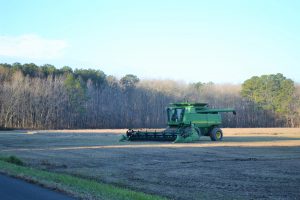
SNOW HILL – Agritourism legislation is moving forward this week after the majority of the Worcester County Commissioners agreed to put their name on the bill.
The agritourism bill discussed among county officials for the last several months is now moving toward a public hearing as five of the commissioners put their name on it. Commissioners Jim Bunting and Chip Bertino expressed concern about the bill’s impact on traditional agriculture.
“We are stewards of the agricultural complexion of this county,” Bertino said. “And not just for now but for generations to come. These changes will be permanent and county wide.”
County staff presented the commissioners Tuesday with a draft agritourism bill that incorporated changes recommended earlier this month, including increased setbacks and limits on the number of festivals permitted. The new draft also sets the use as a special exception, which would require approval from the county’s board of zoning appeals.
When asked how the new bill would impact existing businesses, staff said they’d be nonconforming but would be able to continue to operate as they were now.
Melanie Pursel, director of the Worcester County Office of Tourism and Economic Development, said that while businesses had some concerns about the increased setbacks, she wanted to see some sort of agritourism regulations put in place.
“We’re trying to reach a compromise and move forward with this,” she said.
Bertino said that because existing businesses wanted to see agritourism changes perhaps the changes should just apply to them.
“Why can’t we address the concerns of these particular businesses without changing the zoning?” he said, adding that zoning impacted the entire county.
Staff said the code didn’t currently address agricultural alcohol production and that existing farm breweries had been likened to wineries and required to seek special exceptions.
“I think our concern is, if they have to keep getting special exceptions, it’s open to interpretation and it leaves them vulnerable,” Pursel said.
Chief Administrative Officer Harold Higgins said the county had pursued the agritourism changes to increase revenue.
“Throughout the state, throughout the country, you’re starting to see these venues be more popular,” Higgins said. “It was felt if we’re too strict we’ll never attract that new business here and provide that opportunity to the local farmers that are here, the ability to go into that type of business plan.”
Weston Young, the incoming chief administrative officer, agreed and said it was a way to promote economic development in super rural areas.
“Right now we’re talking alcohol production but conversations also include weddings in barns,” he said. “If you take a step back that is economic development in rural areas.”
Bunting said the county’s agricultural district was supposed to be pure. If anything, he said he’d consider agritourism in the A-2 district but that he still felt the setbacks needed to be larger. he noted that areas of the county were already inundated with tourists.
“Nobody’s suffering for business,” he said. “We can address the issues this handful of people have instead of changing all the whole county, allowing this county wide. It’s not right.”
Commissioner Josh Nordstrom said the agritourism regulations would give farmers the chance to do more with their land.
“If we’re just addressing the businesses that are there we’re missing most of it,” he said. “I don’t see this as hurting farmers at all I think this is something that will help farmers by and large and use their land in the ways that make them most money. Isn’t that what they all want? To get the most money per acre out of their land?”
Pursel stressed the changes would give farmers another option.
“We’re just trying to make a step forward here,” she said.
Bunting maintained that the changes would impact the entire county, not just areas where economic development might be needed. He said the proposal was not in alignment with the county’s comprehensive plan.
Commissioner Ted Elder said he represented more farmers than any of his peers.
“Everyone that I’ve talked to, even if they weren’t willing to do this, thinks it ought to be an option available to them,” Elder said. “Nobody wants more restrictions … This actually takes and gives them another option to use. Sometimes it can save a farm.”
Bunting, noting that he’d spent years on the county’s planning commission as well as its board of zoning appeals, said land was zoned the way it was for a reason.
“Events in an ag district compete with properly zoned properties,” he said.
Commissioner Joe Mitrecic said farmers — and the rest of the general public — would have a chance to comment on the proposed changes when the commissioners held a public hearing on the bill. He acknowledged that some farmers might not want to see changes in the agricultural district.
“I also know there’s a building boom going on and these farms could be subdivided into building lots and we could lose farms to houses and developments,” he said. “If this gives them an option to keep their farm and not sell it off … I have to support it.”

